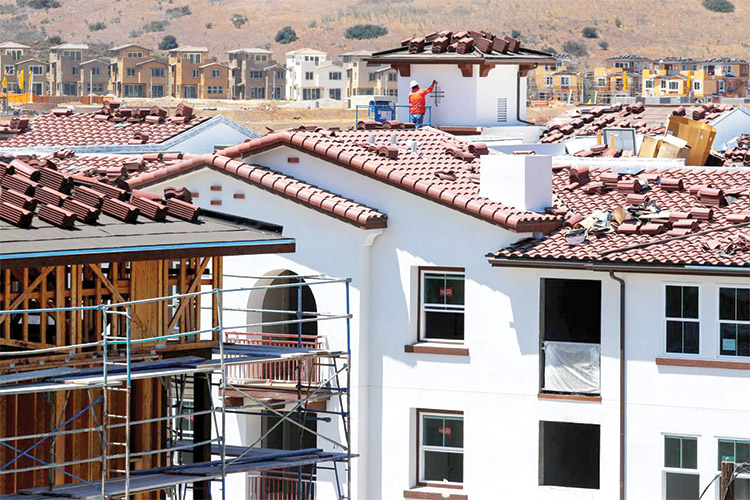US housing sector dependent on economy easing

Development and construction continues on a largescale housing project of over 600 homes in Oceanside, California, US. Reuters
So far this year, the PHLX Housing Index has jumped 16.3 per cent, versus a 9 per cent advance for the benchmark S&P 500.
Housing shares tend to rise from late fall to early spring, in anticipation of the busiest selling season of the year for homebuilders. Since 2002, the PHLX Housing Index has averaged a 7.1 per cent rise between the end of October and the end of April, versus a 3.8 per cent drop outside of that period.
This year’s run-up is pronounced given the sharp tumble US stocks took in the fourth quarter of 2018. The PHLX Housing Index fell 15.7 per cent, even more than the S&P 500’s 14 per cent decline. The seasonal trend in homebuilding shares has been resilient even in the face of dismal data that showed US housing starts dropped to their lowest level in two years.
Yet a survey from the National Association of Home Builders showed that homebuilder confidence increased in February, and the latest housing starts data released by the Commerce Department on Friday showed that homebuilding increased more than expected in January.
Along with a positive outlook for the US economy as a whole, those data support a sustained climb in homebuilding shares, some investors say.
“The risk-reward ratio for housing still looks good, as long as employment and household formation remain strong,” said Eric Marshall, portfolio manager at Hodges Capital in Dallas.
Elevated home prices have been one of the biggest hurdles for the industry, both investors and analysts say. Rising mortgage rates, which climbed past 5 per cent last fall, exacerbated concerns about affordability.
But mortgage rates have since eased in tandem with Treasury yields as the Federal Reserve has indicated it will pause interest-rate hikes and inflation has remained benign. US 30-year mortgage rates are tied to the benchmark 10-year Treasury yield.
“We have had a revival in housing because rates have declined,” said Gary Shilling, president of the investment research firm A. Gary Shilling & Co. in Springfield, New Jersey. Home prices have also moderated, with the S&P/Case-Shiller index showing prices increasing in December by the smallest percentage since November 2014.
The 2017 US federal tax overhaul capped deductions for state and local taxes, which raised concerns that people would be dissuaded from buying homes in high-tax states such as New York and California. But a slowdown in those markets may be offset by an uptick in other regional markets.
The Las Vegas market, for instance, has drawn interest from home buyers deterred by high tax rates in California, said Jack Micenko, housing analyst at Susequehanna Financial Group in New York.
Homebuilders that focus on entry-level homes are also especially poised to reap benefits as more Millennials seek to buy their first homes, said Marshall. Hodges owns shares of Century Communities Inc, DR Horton Inc and LGI Homes Inc, all of which build starter homes. Still, given persistently high home prices, affordability could weigh on the housing market once again, said Torsten Sløk, chief international economist at Deutsche Bank Securities in New York.
That may be especially the case if economic conditions show signs of deterioration. Such concerns rose on Friday when Labor Department data showed the US economy added just 20,000 jobs in February.
While an economic slowdown would support a further decline in interest rates, the ensuing downturn in consumer confidence would outweigh the effect of more accomodative rates, investors say. “The labour market is crucial for consumer confidence,” said Quincy Krosby, chief market strategist at Prudential Financial in Newark, New Jersey. “If it suddenly slows down to where it looks like a recession is coming, the housing market would suffer.”
Meanwhile the US homebuilding increased more than expected in January as construction of single-family housing rebounded after four straight monthly declines, but building permits for these units fell to the lowest level since mid-2017.
Housing starts jumped 18.6 per cent to a seasonally adjusted annual rate of 1.230 million units in January, the Commerce Department said on Friday. Data for December was revised down to show starts declining to a rate of 1.037 million units instead of the previously reported pace of 1.078 million units.
Building permits rose 1.4 per cent to a rate of 1.345 million units in January, driven by an increase in permits for the volatile multi-family housing segment.
Reuters



